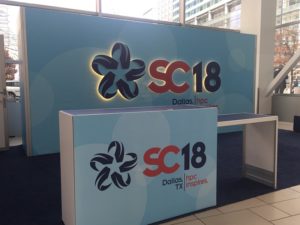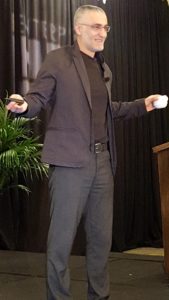At SC18: GM, Boeing, Deere, BP Talk Enterprise HPC Strategies

via Shutterstock
SC18 in Dallas (Nov.11-16) will feature an impressive series of sessions focused on the enterprise HPC deployments at some of the largest industrial companies: Boeing, P&G, John Deere, GM and BP, among others.
Called the HPC Impact Showcase, the sessions will be held on Wednesday and Thursday afternoons, Nov. 14 and 15, 1:30-5 pm, in room D171 of the Kay Bailey Hutchinson Convention Center.
Speaking from personal experience, a recommended session is one to be offered by the humorous and sardonic Dr. Mohamad El-Zein, a John Deere fellow in materials engineering. Determined not overawed by HPC, El-Zein regards HPC as a powerful, practical and imperfect tool (at least, he did as of two years ago), not a magical black box. At Deere, he leads projects in design, modeling and simulation, with specialties in mechanics and materials modeling.
On Thursday at 4:15 pm, he will speak on “Emergence of Tools - a Competitive Advantage at John Deere,” in which HPC has evolved beyond driving bigger models and brute-force computing to supporting more lucrative use cases that combine HPC, data science, machine learning and IoT. A model of how to use all of them will be presented.
Preceding him at 3:30 will be Ajay R. Deshpande, R&D IT infrastructure leader at General Motors, who currently manages multiple HPC projects in support of the company’s road-to-lab-to-math strategy.
At GM for five years after 13 years at HPE, Deshpande will discuss the growing role of advanced CAE, including the critical importance of accurate modelling as a key step to establish robust math-based simulations for design and development. For example, in internal combustion engines, the mixture preparation process is highly coupled with combustion performance and emissions behavior.
The Impact Showcase session begin on Wednesday at 1 pm with Sean Dettrick, computational modeling group lead at TAE Technologies, a venture- backed company working on commercial fusion energy and sustainable solutions. He specializes in developing HPC codes for fusion plasmas, primarily using kinetic methods, such as particle-in-cell and Monte Carlo, for interpretation of experimental behavior.
His session, “Data Fusion for Nuclear Fusion – Using HPC To Put a Star in a Bottle” – will discuss developments in fusion energy, which offers the prospect of a carbon-neutral and inexhaustible energy source.
He will be followed at 2:15 by Pete Bradley, a fellow in HPC and modeling at United Technologies Pratt & Whitney, who will discuss his company’s cloud HPC strategies. For more than 25 years, Bradley has driven advanced computing applications for aerospace design and manufacturing, and currently leads Pratt & Whitney’s HPC operation and application of HPC-enabled tools for aerodynamic and structural design.
At 3:30, Miguel Palacios, service leader - HPC, modeling and simulation at Procter & Gamble, will present on “HPC Enables Simulation-Led Innovation in Places You Would Not Expect,” in which he will discuss simulation-led innovation at a wide range of industrial and consumer product applications – from predicting phase chemistry of a detergent, to the strength of a package, to how skin moisturizers actually work. “Computationally intensive simulation is the perfect link between incomplete theory and hard to run experiments,” Palacios said, “and leads to important insights that in turn lead to innovations that billions of people use every day.”
At 4 pm, Joerg Gablonsky, chair of the Boeing Enterprise HPC Council, will discuss “The Enterprise HPC Service at Boeing,” focusing on the role of HPC and simulation as critical enablers for Boeing product design. Gablonsky will highlight the characteristics of a successful enterprise HPC service for a diverse users and organizations, the need for increasing HPC capabilities and how HPC can be linked directly to significant cost savings.
 Closing out Wednesday’s showcase session will be Richard B. Arthur, senior principal engineer and senior director, advanced computational methods research, GE Global Research, who will discuss “Computationally Accelerated Engineering at GE: Physics + Deep Learning.” He will examine GE’s centralized HPC environment for computational modeling, simulation and analytics in support of a global team of engineers working on designing, building and servicing complex machines, such as jet engines and gas turbines.
Closing out Wednesday’s showcase session will be Richard B. Arthur, senior principal engineer and senior director, advanced computational methods research, GE Global Research, who will discuss “Computationally Accelerated Engineering at GE: Physics + Deep Learning.” He will examine GE’s centralized HPC environment for computational modeling, simulation and analytics in support of a global team of engineers working on designing, building and servicing complex machines, such as jet engines and gas turbines.
The Thursday showcase session begin at 1:30 with “The BP Data Science Sandbox,” focusing on major advances in machine learning, including natural language processing and 2D computer vision. The session will be led by Max Grossman and Anar Yusifov of BP.
They will discuss domain expertise required to successfully deploy machine learning in medicine, science, and engineering. “While classifying an image as a cat, dog, horse, etc., is a task that anyone can understand, automatic identification of malignant tumors, subsurface faults or financial fraud (for example) often requires far more background in the specific domain,” said the presenters.
On Thursday at 2:15, Douglas D. Cline, senior computing systems architect for HPC at Lockheed Martin Aeronautics, will lead a session on “Challenges and Solutions in the Industrial Application of HPC,” in which he will discuss the unique challenges of deploying HPC in the development of engineered products when compared to HPC in government laboratories and universities. Challenges include supporting a diverse user community, security compliance and coordination of HPC tasks across multiple organizational boundaries.
Cline will describe some of Lockheed Martin’s HPC strategies, including HPC system architecture for security, unique discipline-specific architectures and overall HPC requirements in an industrial environment.











